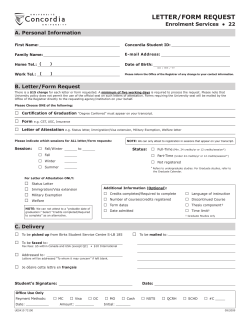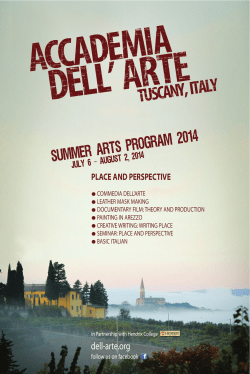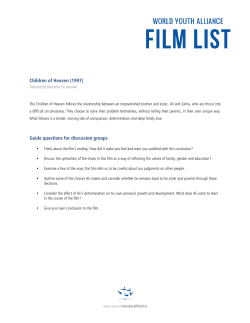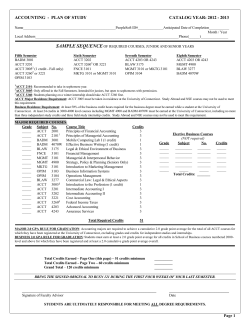
BFA REGISTRATION INFORMATION & CHOICE COURSE DESCRIPTIONS SUMMER 2014: Los Angeles Campus
BFA REGISTRATION INFORMATION & CHOICE COURSE DESCRIPTIONS SUMMER 2014: 6/30/2014 – 10/10/2014 Los Angeles Campus Welcome to the Summer 2014 BFA Registration process. Review ALL the information throughout the packet and register for the specific semester and program in which you will be enrolled for the Summer 2014 semester. Familiarize yourself with the packet, as it contains the information necessary for making course selections. Visit the AMDA website at www.amda.edu to download your registration form. Select the “Registration Form” specific to the program and semester level in which you WILL BE enrolled for the Summer 2014 semester. Once completed, email the form to laregistration@amda.edu. [email instructions are provided on the registration form] Retain a copy for your records. REGISTRATION DEADLINE: FRIDAY, APRIL 25TH This Registration process is applicable to BFA students only. Please direct all questions to AMDA’s Education Dept. Thank you. Textbooks are available for purchase through the AMDA-Amazon website at the following URL address: http://astore.amazon.com/amte-20 A comprehensive list of textbooks is located on the AMDA website under the “Student Life/Student Resources” tab at the following URL: http://www.amda.edu/student-life/student-resources. Summer 2014 “Choice Course” Descriptions This information provides students with course descriptions to assist in the choice course selection. Students will be apprised of required textbooks upon receiving their course syllabi and viewing the textbook list for SU14 on the AMDA website. Students will need to be prepared to purchase plays, scripts and/or copies of scenes as deemed by a course’s curriculum. Courses are subject to change, AMDA will make every attempt to notify students if/when there is a change in course offerings. **Students who have been approved to accelerate into 8th semester must register for the required Entrepreneurship class, usually scheduled in 7th semester. Students will need to select the course for either a Performance Immersion 1.5 credits OR Critical Studies 3.0 credits dependent upon the category they need to fulfill. Critical Studies “Choice Courses” THEATRE ROOTS Category: 1. TR108: Theatre History: Inception Provides an artistic, intellectual, historical, sociopolitical and overall cultural context for major playwrights and theatrical traditions. Significant dramatists are studied and numerous works from Egyptian Ritual of 2500 B.C.E. to the Spanish Golden Age of 1640 C.E. are read, discussed, and analyzed; the cultural framework of each period is examined. Film and video clips display performance traditions as well as theatre architecture, makeup, costuming and performance styles. Oral presentations and attendance at play performances often supplement the coursework. 3.0 credits 2. TR109: Theatre History: Emergence Students will trace the development of contemporary Western theatre by examining dramatic texts from 19th Century Realism to the present. Emphasis is placed on the influence of Ibsen, Chekhov, and Strindberg. Compare conventions of each period, acting styles, and analyze the role of politics, economics, and philosophy in developing theatre. 3.0 credits 3. TR110: Theatre History: American Evolution Examine the expansion of drama and the development of theatre after World War II to the present day 4. TR211: History of the American Musical This course is a select, yet comprehensive study of American Musical Theatre covering the time period 1875-1943 5. TR212: A Decade of Pulitzer Playwrights A decade of Plays (and playwrights) as explored through those honored with a Pulitzer Prize. This course will 6. TR226: Restoration & 18 Century Comedy Covering the work of Wycherley (Country Wife), Etherege (The Man of Mode), Congreve (The Way of the World), Steele (The Conscious Lovers), Sheridan (The School for Scandal), Behn (The Rover). The close relationship between theater and society during the period will be focused upon. 3.0 credits 7. TR227: 19 Century American Drama Covering work from 1787 (Tyler) The Contrast through such important work as Fashion (Mowatt), Uncle Tom's Cabin 8. including The American Musical, American Tragedy, The American Dream, American Realism, The Group Theatre, Repertory Theatres, Activism and the Changing Audience. 3.0 credits which includes the dawning of the Golden Age of Musical Theatre. 3.0 credits examine original distinguished Plays that resonate with American Life. 3.0 credits th th (Aiken/Stowe), The Octoroon (Boucicault). Course to include such plays as Secret Service, The Count of Monte Christo (Dumas) and continuing on through some of the most important works of the latter half of the 19th Century: The Great Divide, The New York Idea, Salvation Nell, and The Scarecrow. 3.0 credits TR228: Music Appreciation Students will acquire an historical overview of Western culture and society, and its direct influence on the evolution of Western Music, as defined by each of the classical music eras (Medieval, Renaissance, Baroque, Classical, Romantic, Modern, Contemporary). 3.0 credits CREATIVE EXPLORATION Category: 1. CE203: Cultures of Fear and Horror Horror and fear play seminal roles in the construction of cultural mythos and practice. In this course we will examine the 2. CE204: History of Independent Cinema An exploration of the independent film movement in America from 1970-2000. Monumental independent film will be discussed and critiqued in terms of esthetics, styles and shooting strategies. Cultural and historical events that coincide with each selected film will be examined. 3.0 credits 3. CE211: Film and Society This course will examine the "American experience" via cinematic representation and analysis. Students will contextualize the films via texts drawing from anthropology, film studies, basic film production and culture theory. Course work will include a research paper and the production and the development of a fictional character representing students' conceptualizations of Americana. This course will examine the "American experience" via cinematic representation and analysis. Students will contextualize the films via texts drawing from anthropology, film studies, basic film production and culture theory. Course work will include a research paper and the production and the development of a fictional character representing students' conceptualizations of Americana. 3.0 credits 4. CE222: World Music Students will explore non-Western music traditions, trends and practices. This course will provide a platform for critical analysis and construction and application of central themes in the scope of international horror cinema and how they reveal salient aspects of cultural similarities and differences including: gender, sexuality, violence and socio-political climates. Students will contextualize the films via texts drawing from anthropology, film studies, basic film production and culture theory. 3.0 credits appreciation of cultural diversity through music. 3.0 credits ENGLISH Category: 1. EN301: Playwriting/Screenwriting (Prerequisite: English Composition for the Actor) This course is designed to explore the fundamentals of Playwriting and 2. EN302: TV Writing/Screenwriting (Prerequisite: English Composition for the Actor) Writing for Television and Film explores the fundamentals and techniques used in writing for the large and small screen. Both genres are deeply structural in nature and mastery of their formats will open a world of creative understanding and opportunity. Through a series of classroom discussions, readings, writing exercises and viewing assignments, students will develop a detailed knowledge of structure, story and character development. Assignments may include pitching of an original episode for an existing series, creating a spec script and/or a scene for a film screenplay. 3.0 credits 2 Screenwriting while allowing students to develop their skills in creating compelling characters, dialogue and plot. Students will learn basic elements of dramatic structure and recognize parallels and differences between the two art forms of playwriting and screenwriting. 3.0 credits Education Department 4/2014 Summer 2014 “Choice Course” Descriptions Continued SCI/TECH Category: 1. SCI214: Health and Wellness This course emphasizes the importance of knowledge, attitudes, and practices relating to personal health and wellness. It is a course designed to expose students to a broad range of issues and information relating to the various aspects of personal health, which include the physical, social, emotional, intellectual, spiritual and environmental aspects. Topics of exploration include, but are not limited to: nutrition, foods-buying strategies and budgeting, physical fitness, stress management and lifestyle choices for optimum health. 3.0 credits 2. SCI216: Vocal and Respiratory Anatomy Producing vocal sound is much more than the repetitive opening and closing of the vocal folds. It involves synchronized activity of much of the entire body making a singer's body the whole instrument. Students will study and analyze the structure of the body, respiratory system and vibratory system as these systems relate to creating vocal sound. Areas of specific study will include body posture and alignment, body mapping, intrinsic and extrinsic kinesthetic awareness, the appoggio-based breath, sub-glottal pressure, vocal on-set and resulting resonance. Singing is a required component of this course, no previous vocal training necessary 3.0 credits 3. SCI217 Kinesiology Kinesiology, also known as human kinetics, is the study of human movement. Kinesiology addresses physiological, mechanical, and psychological mechanisms. Applications of kinesiology to human health include: strength and conditioning; sport psychology; methods of rehabilitation, such as physical and occupational therapy; and sport and exercise. 3.0 credits Performance Immersion “Choice Course” ACTING AC121 Acting II (Prerequisite: Acting 1 or Acting Fundamentals) Students will grow as performers by physically incorporating truthfulness, economy, specificity and spontaneity into their scene work. Risk taking and maintaining simplicity and appropriateness in acting choices is emphasized. Continued application of acting techniques will contribute to an expanded performance skill set. Repertoire will focus on selections from 20th-century American drama. 3.5 credits AC200 Alexander Technique A practice for more than 100 years, and beloved by performing artists of all disciplines, the Alexander Technique is a practical educational method that teaches awareness and prevention of unnecessary and harmful muscular tension in the body. The technique promotes ease and efficiency of movement, enhanced balance and coordination, improved vocal and respiratory functioning, and a more reliable sensory perception. 1.0 credit AC313 Voice Acting (Prerequisite: Acting 1 or Acting Fundamentals) This is an introductory course designed for students interested in animation voice talent. The course will investigate the acting skills, vocal skills and techniques required to pursue a career in the Voice Acting and Animation industries. 1.5 credits DN130 Fitness and Injury Prevention The course will identify dance related injuries and will explore the various strength and conditioning techniques that prevent these injuries. The course will also address the physical and mental needs of dancers. 1.5 credits DN270 Character in Motion An in-depth look at character development and storytelling through movement, music and physical expression. This course is designed to provide the actor for a wide range of physical challenges and broadened career opportunities. 1.5 credits MT338 Ensemble Singing for the Actor Actors will expand their ability to create effective characters through performances enhanced with musical elements. Working as an ensemble, students will explore vocal expression, musicality and singing harmony, movement and staging. 1.5 credits IMPROVISATION AC122 Improvisation I: Foundations Students will have the opportunity to develop and master basic improvisational skills. Improvisation will be used to enhance and strengthen focus, imagination, listening on stage and the use of physical choices. Learning to trust oneself and one’s partner while supporting other performers on stage are additional components to this course. 1.5 credits AC123 Improvisation II: Technique (Prerequisite: Improvisation I) Improvisational skills continue further development with emphasis on kinesthetic and sensory awareness. Advanced exercises in concentration, problem-solving, moment-to-moment interaction and spontaneity are highlighted. Special emphasis is placed on character development. Students will portray a myriad of well-rounded characters, exploring strong storylines. 1.5 credits AC202 Improvisation: Intro to Long Form (Prerequisites: Improvisation I) This course introduces students to a range of improvisation games and techniques, associated with Long Form Improv. Non-verbal, verbal, and sensory improvisation scene work will be explored. The student is taught to play honestly within a visceral environment and to interact spontaneously, considering the needs and responses of fellow actors. 1.5 credits AC300 Advanced Improvisation: Genres (Prerequisites: Improvisation II or Intro to Long Form) Identify traits within certain artistic genres and apply those traits to improvise a "new" version of scenes and stories. Sometimes it's an atmosphere, sometimes it's a style of acting, sometimes it's the type of characters or the kind of things that happen; usually it's a loose mixture of all of the above. Some of the common genres that may be explored are: Shakespeare, Tennessee Williams, Musicals, Films (Sci-Fi, Noir, Western, gangster, etc.), Fairy tales, and more. A mixture of short and/or long form Improv may be used. 1.5 credits FILM SURVEY FL280 Film Survey: Great Performances (Prerequisite: FL180 Hist. of the Entertainment Business) Building on the historical overview provided by FL180, this course offers a comprehensive study of the greatest film careers of the 20th and 21st Centuries. Through feature films, documentaries and televised interviews with film stars; students will explore the lives of film’s greatest personalities. The careers of Billy Wilder, Frank Capra, Stanley Kramer, Alfred Hitchcock, Bette Davis, Jack Lemmon, James Dean, Marilyn Monroe and Orson Welles, along with many others, are explored. 1.5 credits FL380 Film Survey: The Art of the Motion Picture (Prerequisite: FL180 Hist. of the Entertainment Business) Building on the foundation provided in FL180, students will explore the history, progression and styles of movies with an emphasis on direction, writing and cinematography. In this final Film Survey course, students will examine the artistry behind filmmaking. Courses do not need to be taken sequentially. 1.5 credits 3 Education Department 4/2014 Summer 2014 “Choice Course” Descriptions Continued MUSIC THEATRE MT125 Musical Theatre Fundamentals An introductory course exploring fundamental skills necessary for the preparation and effective performance of musical theatre songs. The use of AMDA’s "The Approach to a Song" will help students overcome fears leading to creative, alive, immediate, active and truthful musical theatre performances. 2.0 credits MT222 Singing Techniques Fundamentals I The production of a free sound without constriction is the central goal of this course. Careful attention is given to assessing the individual needs of each student, establishing vocal range; and reinforcing breath management. In addition to singing pure vowels, attention will be given to focus, placement and resonance, diction and clear tone, correct posture, and the release of physical constrictions. A healthy voice will be built through consistent vocal habits that translate to all styles of singing. 1.0 credit MU131 Jazz Harmonies Focused on the exploration of vocal jazz harmonies, this course will navigate through the similarities and differences found between jazz chording and traditional western chording. Vocal improvisation will also be explored, including scat-singing and variance within a given melodic line. 1.0 credit MU145 Songwriting: Piano Based Students will learn the fundamental concepts of music theory associated with song form, as related to piano-based songwriting. Traditional and unconventional chord progressions, music hooks and music themes within standard sections of song structure will be introduced and developed. Prerequisite: MU141 Piano Fundamentals and MU143 Piano Techniques OR approval from AMDA piano faculty. 1.0 credit MU150 Introduction to Guitar This course will provide an introduction to the components and structure of the acoustic guitar. Students will begin exploration of guitar tablature and will acquire skills relating to basic chordal strumming and note picking. 1.0 credit *Guitars will be provided during class time and will also be available for student practice during weekly scheduled Guitar Lab Sessions. MU151 Guitar Fundamentals This course is designed for beginning-level guitar students who are able to demonstrate a working knowledge of the instrument’s basic components and structure. Pre-requisite: MU150 Introduction to Guitar OR approval from AMDA Guitar Faculty. 1.0 credit *Guitars will be provided during class time and will also be available for student practice during weekly scheduled Guitar Lab Sessions. MU153 Guitar Techniques This course is designed for the advanced beginner. Students who demonstrate a working knowledge of open chords, barre chords, scales and can play songs in their entirety are approved for this course. Pre-requisite: Approval from AMDA Guitar faculty is required. 1.0 credit *Guitars will be provided during class time and will also be available for student practice during weekly scheduled Guitar Lab Sessions. MU155 Songwriting: Guitar Based Students will learn the fundamental concepts of music theory associated with song form, as related to guitar-based songwriting. Traditional and unconventional chord progressions, music hooks and music themes within standard sections of song structure will be introduced and developed. Prerequisite: Approval from AMDA Guitar faculty is required. 1.0 credit *Guitars will be provided during class time and will also be available for student practice during weekly scheduled Guitar Lab Sessions. MU231 Small Vocal Ensemble: Barbershop, Doo-Wop and Motown Students examine small-ensemble vocal repertoire, ranging from the traditional Barbershop harmonies to the early mainstream sounds of Doo-Wop and Motown. In addition to the exploration of vocal styles, this course will further develop basic musicianship skills for the professional vocalist, including Sight-Singing, retention of harmony and aural dictation. 1.0 credit STAGE COMBAT SC100 Stage Combat I: Unarmed Students are introduced to the concentrated study unarmed stage combat techniques. Students develop an awareness of body, movement and partnering. Students will learn safe and effective techniques for creating and executing a choreographed unarmed fight scene. 1.5 credits SC180 Stage Combat II: Single Sword (Prerequisite: Stage Combat I) An introduction to the art of single swordplay through the mechanics and techniques of footwork and choreography, including the history and development of the Western European Rapier. Through continued study of basic principles of stage combat, students will execute a dramatic moment of illusionary violence with the sword. 1.5 credits SC280 Stage Combat III: Broadsword, Rapier & Dagger (Prerequisites: Stage Combat I and II) Advanced stage combat techniques are developed through the study and use of Broadsword and the Rapier and Dagger. Students will apply all previously studied principles of stage combat and execute choreographed fights incorporating scenes from dramatic literature. 1.5 credits SC382 Advanced Stage Combat: Environmental (Prerequisite: Stage Combat III) Advanced conditioning and training in theatrical combat skills including: Advanced Unarmed & Martial Arts techniques, Found Objects, Breakaways, Low Falls and Tumbling, Blood Effects, etc. Students will work toward a final presentation of portions of this work in environmental specific areas. 1.5 credits VOICE, PRODUCTION & SPEECH VP300 VPS: IPA/Intro to Dialects (Prerequisite: VPS III) Students are introduced to the International Phonetic Alphabet as it pertains to understanding and performing a dialect. Received Pronunciation or "High British" will be the primary dialect. Cockney and/or other dialects may also be explored (General American Pronunciation is considered a dialect). Coursework will also include the reinforcement of voice production, warm-ups, and a comprehensive vocal technique. 1.5 credits th th VP408 *Dialects: Directed Studies: 7 /8 semester: German and South African (Prerequisite: VPS IPA/Intro to Dialects) Students delve into advanced dialect work designed to increase the actor's casting potential. In addition, voice production, warm-ups and comprehensive vocal technique will be reinforced. 1.5 credits Courses are subject to change, AMDA will make every attempt to notify students if/when there is a change in course offerings. 4 Education Department 4/2014
© Copyright 2025


















